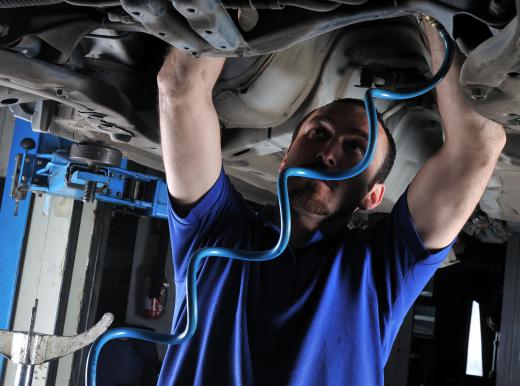A torque screwdriver is a tool used to turn screw head fasteners to a precise and uniform tension. Torque is the measure of turning strength applied to twist an object. The English system measures torque in units of foot pounds or inch pounds, and the metric system uses Newton meters. Manually powered, pneumatic, and electric versions of the torque screwdriver are available to meet the needs of almost any size project. Most torque screwdrivers are adjustable within a range of torque strengths to accommodate multiple applications.
Manual torque screwdrivers generally have an in-line drive shaft and handle similar to the traditional screwdrivers. Electric models may have this same form or have an offset handle that makes them look more like an electric drill. A pneumatic or air-powered torque wrench almost always looks like a drill and is typically the most powerful variety of torque screwdriver.

The unique operational feature of a torque screwdriver is the pressure-sensitive clutch. This built-in limiter controls the maximum amount of turning power applied to the screw by disengaging the drive connection at the preset torque level. Adjusting the clutch position allows the user to set the torque within the range offered by the tool. Most manual and air-powered torque screwdrivers feature slip-clutch and cam-over designs that allow the tool to continue operating as the drive gears separate. Automatic shut-off clutches go a step further by powering down the electronic torque screwdriver completely to allow for even more precise torque control.

Corporate manufacturing operations often use torque screwdrivers to attach multiple joints on a product with equal pressure. Torque screwdrivers greatly reduce the variations between screw fastener attachments that are common when multiple builders are completing a large project together. Equally driven screws increase the structural integrity and overall stability of an assembled item. Overdriving a screw often splits the material or damages the screw threads and ultimately weakens the fasteners' connection. Sending the screw in too short may not drive it into the second surface and make the connection.
Torque screwdrivers that get regular use are often tested and recalibrated to insure a constant torque output. A machine called a torque tester is attached to the head of the tool to give a reading of the applied turning power once the torque screwdriver is fully engaged. Damage from extensive use may cause bends and cracks in the gears of a torque screwdriver that render it unable to sustain a set torque value.
